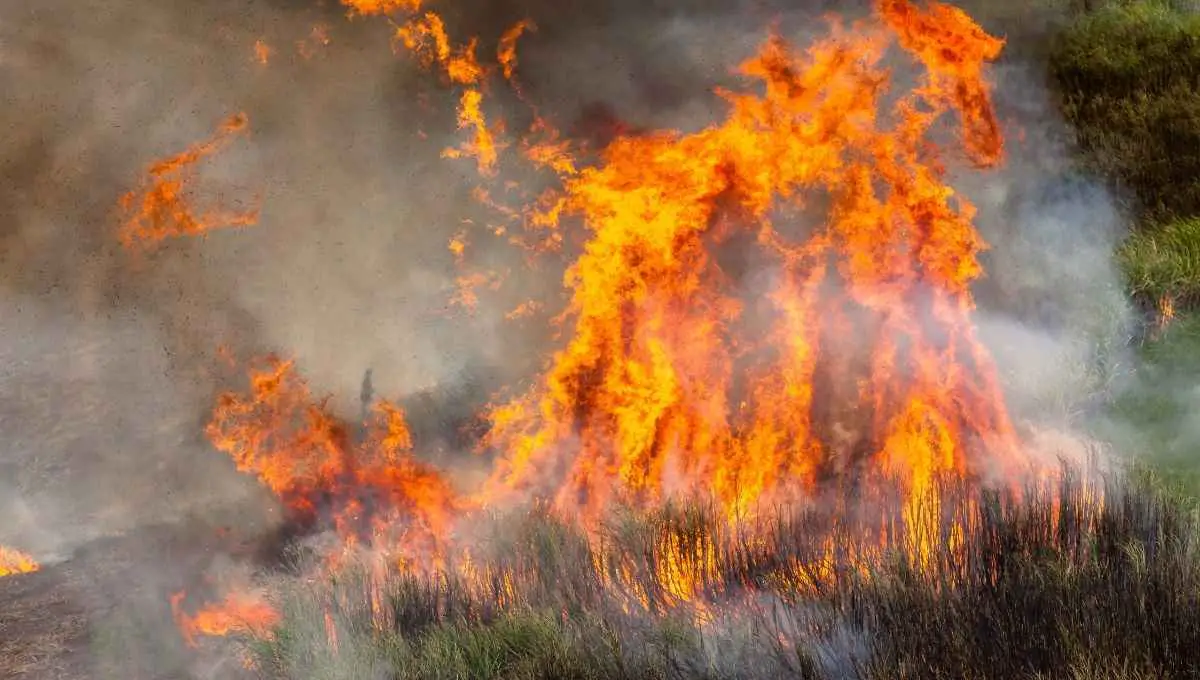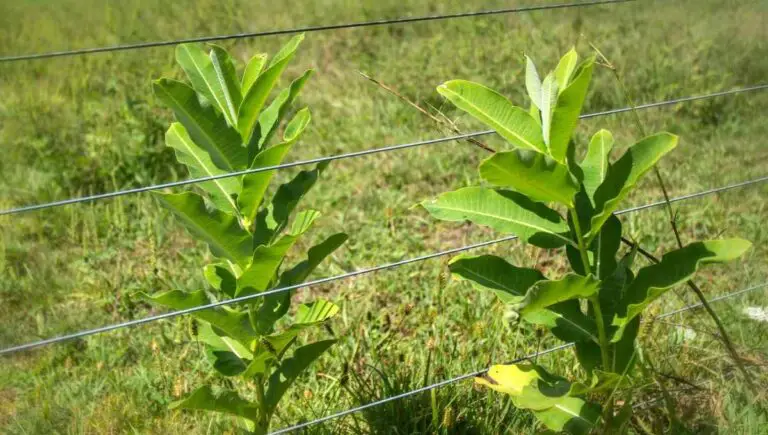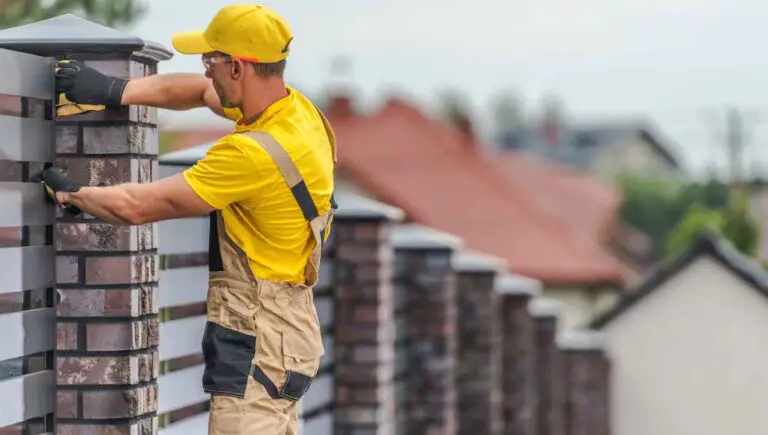Can an Electric Fence Start a Fire? (Watch Out for This!)

With wildfires ravaging the United States all year round, people are looking for ways to prevent fires from starting. If you own an electric fence, you have probably wondered if an electric fence can start a fire.
Although it is unlikely for an electric fence to start a fire, it is still possible under the right conditions. Knowing how to prevent an electric fence fire is the first step in preventing them from happening.
Thankfully, we have unpacked all the reasons why an electric fence could start a fire so you can have a better understanding to prevent any fires from happening on your property.
This post contains affiliate links from Amazon and other stores. This means Yard Blogger may earn a commission if you make a purchase using any of our links. Please refer to our full affiliate disclosure policy for full details.
Here’s a Quick Pro Tip!
Electric fences rarely cause fires but when they do, the cause could have been easily avoided.
The following products can keep you prepared and prevent a fire from starting:
1. Zareba AC Charger – An alternating current charger is less likely to start a fire than a continuous current charger
2. Digital Voltage Meter – A great tool to identify where a short is happening
Can Electric Fences Cause Fires?
It is possible that an electric fence can cause a fire if certain measures are not followed and also during certain dry weather conditions. But, following proper installation instructions and common sense will help you avoid a fire.
Ensuring that the charger of the fence is NOT a continuous current is your first step to avoiding an electric fence fire.
This charger will emit continuous electricity and if anything touches it, the chances of a fire happening are greatly increased compared to an electric fence that only pulsates.
Having an electric fence turned on during very dry weather conditions and fire bans is also a bad idea. Any spark that may come off the fence onto dry vegetation can encourage a fire to start.
Will an Electric Fence Start a Fire?
An electric fence can start a fire under certain scenarios such as dry weather conditions or an improperly installed fence. However, if you follow proper installation and maintenance of your fence, you should be safe from a fire.
Most cities will recommend turning off your electric fence during a fire ban or under extremely dry weather conditions. Any spark from the fence can land on dry vegetation and ignite a fire.
You should also maintain the grass around your electric fence to ensure that it doesn’t touch the bottom wires of your fence. While this does not mean that the grass will catch on fire, it does increase the chances.
Can an Electric Fence Start a Fire?
Under favorable conditions, an electric fence can start a fire. All a fire needs to start is a quick spark and something dry. Ensuring your fence is properly installed and maintaining the area around it will help you prevent a fire.
When purchasing an electric fence, make sure it doesn’t have a continuous current charger. This charger is very old and dangerous yet is still being sold.
It greatly increases the chance of a fire starting and should be avoided.
How to Avoid Fires Started From Electric Fences
To avoid fires started from electric fences, ensure that there isn’t any dry vegetation around your fence. If there is, cut it as short as you can. The dry vegetation is the perfect ingredient to start a fire.
Also, make sure that the bottom wire of your fence is not hot and there isn’t any excessive sparking happening. Heat and dry conditions is the perfect opportunity for a fire to start.
You might also enjoy our post on If An Electric Fence Can Kill You
Is Electric Fencing Safe?
Electric fencing is safe if you properly install, maintain, and protect against it. Electric fences are used all around the world and only present unsafe conditions when it is not being properly used and maintained.
If you are unsure how to properly install an electric fence, you should contact a professional. Purchasing the wrong charger for your fence can seriously injure whatever you are trying to keep away from the fence.
The wrong charger can also increase the chance of a fire starting since it may cause the fence to short which will produce sparks to fly. These sparks could land on something that would favor a fire to start.
Are Electric Fences a Fire Hazard?
Electric fences can become a fire hazard if certain precautions are not met. The most important thing to remember is to always keep dry or dead vegetation, such as grass, away from the electric fence.
Sparks can fly very far off an electric fence and if one lands on a patch of dead grass, it can create a devastating wildfire.
And since wildfires are already a crisis in the world right now, there is no point in creating more.
What Causes an Electric Fence to Start a Fire?
An electric fence can start a fire if conditions are very dry or if you have a continuous current charger. Both of these situations will encourage a fire to start which might wreak havoc on your yard.
If you live in an area that is going through a particularly dry season, specifically in California and other wildfire-ridden areas, then it is wise to turn off your electric fence.
The sparks that come off your electric fence can ignite any dry vegetation that is surrounding it and start a fire.
You can also increase your chance of a fire starting if you use a continuous current charger.
When this type of charger is used, it increases the chance of the bottom wires being able to start a fire with the surrounding grass since there is a constant flow of electricity.
Does Dry Vegetation Touching an Electric Fence Cause a Fire?
Dry vegetation and an electric fence definitely are a recipe for a fire. Electric fences naturally spark, sometimes so small you can’t even see it, but still enough to start a fire if there is dry vegetation around.
To keep this from happening you should ensure your grass never gets too dry around your fence. This may require some extra watering but it will be worth it.
Also, make sure the grass doesn’t get too high and touch your fence.
You might also enjoy our post on Can You Have an Electric Fence Around Your Property?
What Happens if Grass Touches an Electric Fence?
When grass touches an electric fence, it will suck the voltage and amperage out of your fence, making it less effective. If there is excessive grass touching your fence, it can stop working completely.
The grass that touches the bottom wires of the fence causes the fence to become grounded. Essentially this means that less electricity is running through the fence.
If you pair this scenario with a weak charger, then your fence will be completely ineffective.
Why Is the Ground Wire Hot on My Electric Fence?
The ground wire on your electric fence being hot typically indicates a problem with either a leakage in your system or a bad electrical connection. Diagnosing the problem is crucial to avoid any fires from starting.
The ground wire of your electric fence is meant to absorb a lot of electricity but it should never get hot. There is likely a problem with your semiconductors or capacitors in the circuit.
Using a clamp meter device is a great way to check for this issue.
How Can I Tell if My Electric Fence Is Hot?
An easy way to tell if your electric fence is hot is by turning off the electricity and then testing the heat with your hand. Don’t touch it right away but instead, feel for heat coming off of it.
If you grab onto the fence right away, you could potentially burn yourself. Simply place your hand above the fence to see if any heat waves are coming off it.
If it is hot, then you should try to identify why so it won’t create a fire.
What Type of Energizer Should I Use for My Electric Fence?
Most situations call for an alternating current energizer/charger. This type of energizer produces quick pulses that scare off animals but do not harm them. It simply creates a bad memory in their mind so they avoid the fence in the future.
Alternating current chargers also offer higher amperage and voltage that can make the fence more effective. Continuous current energizers have to provide lower amperages and voltages since the shock is continuous and more deadly.
This Zareba Alternating Current Charger is a great option for your electric fence since it supplies up to ten miles of electric fencing and is perfect for keeping animals and wildlife in or out, depending on your needs.
What Is a Continuous Current Energizer?
A continuous currency energizer is a device that regulates the energy to the electric fence. The continuous current means there is a constant charge on the fence wires as opposed to pulsing charges.
It is rare for someone to use a continuous current energizer since they are dangerous and not practical in areas that have a lot of vegetation. The amps of this fence are so low that any vegetation that touches it will ground the fence.
Do Continuous Currents Cause Electric Fence Fires?
Continuous current charges should always be avoided on electric fences. Not only are they dangerous and outdated but they also increase the chances of a fire starting due to the constant flow of electricity.
Electric fences should always use an alternating current charger. This charger emits pulses of electrical shocks that give whoever is encountering the fence a chance to break free.
Continuous currents do not allow this opportunity and can greatly harm someone. They also will encourage a fire to start very easily if grass comes into contact with the fence.
The fence will slowly kill healthy grass and then when the grass is dry enough, a fire will start.
Why Do Electric Fences Pulse
Electric fences pulse thanks to the alternating current charger. This charger makes the current of electricity go back and forth extremely quickly emitting pulses every one-tenth of a second.
This design of electricity is used to benefit the health of an animal that gets into contact with the fence. The fence is not meant to hurt the animal, only scare it.
So, the electric pulse gives the animal an opportunity to break free during the quick moments in between shocks.
How Do Pulsed Energizers Work?
Pulsed energizers work by alternating the electrical current back and forth very quickly. This method creates a quick pulse of a shock that happens every one-tenth of a second. The quick pulse prevents someone or something from becoming stuck on the fence.
This type of shock is different than a shock from an electrical outlet. An outlet uses continuous currents so when you get shocked you feel as though you can’t let go and you continue to get shocked.
Electric fences were designed to keep people safe from this scenario so they use pulsed energizers to give someone the opportunity to break away from the fence in between those quick moments when the shock stops.
You might also enjoy our post on If An Electric Fence Can Kill A Dog
Does Netting Cause an Electric Fence Fire?
It is rare that netting can cause an electric fence fire. The only scenario where this could happen is if there is dry vegetation touching the netting and a continuous current charger is being used.
This is the perfect recipe for an electric fence fire. The netting will be constantly emitting electrical waves and when that touches dry vegetation, it increases the chance of a fire from starting.
Why Is My Electric Fence Shorting?
Your electric fence shorts when the power is redirected to the ground. This can occur because of many different situations and requires a thorough examination to identify the reason.
If your electric fence is shorting, it could be caused by the following situations:
- A broken underground cable
- Broken wire or insulator
- A loose connection
- Something touching the fence
However, it may be hard to find where a short is happening especially if you have a fence that covers an extensive area. Having a device that measures the voltage of your fence will help you identify where the short is.
Will a Wire Short Cause an Electric Fence Fire?
It is unlikely that a wire short will cause an electric fence fire. A short will happen if wet vegetation touches the wire and wet vegetation can’t ignite. If the vegetation becomes dry, the short will disappear, so, the chances are low.
One possible scenario that could cause a fire due to a wire short is when a wire shorts to an object on the ground that is metal and on dry vegetation.
This is very unlikely but still possible. If you maintain the area around your fence, then this shouldn’t happen.
How to Find Short in Electric Fence
To find a short in an electric fence, you can use a device that measures the voltage of your fence. The cause of the short will be identified in the area that has less voltage than the rest.
You can identify where the short is happening by using a digital voltmeter. This will help you identify the area that is shorting which will make it easier for you to determine the cause.
Electric Fencing in Dry Conditions
Electric fencing can be very dangerous in dry conditions since dry conditions favor fires. If you live in an area that is susceptible to wildfires or going through an exceptionally dry season, you should consider turning off your electric fence.
Electric fences can spark all the time and when that spark reaches dry vegetation, it is the perfect condition for a fire to start.
Maintaining the area around your fence by keeping the vegetation healthy, will help you prevent any fires from starting.
Electric Fence Sparking
Electric fences can spark when electricity is crossing through any hardware of the fence, such as a gate hook, or if vegetation is touching the fence. An excessive amount of sparking is dangerous and causes your fence to lose power.
Knowing where to look for sparking will help you come up with a solution easier.
Keep in mind these scenarios that can cause a spark to happen:
- Vegetation that is touching the fence
- Gate hooks touching the wire
- Splices in the wire
Sparks are a common source that causes electric fence fires to happen, especially around dry vegetation. If you notice that your fence is sparking you should treat it right away.
Is It Normal for an Electric Fence to Spark?
It is normal and pretty common for an electric fence to spark. The sparking happens because the electric current is crossing through the hardware of the fence, which is hard to avoid.
However, too much of anything quickly becomes a bad thing. If your fence is sparking excessively it can pose a risk of a fire if the sparks come into contact with dry vegetation.
You should try to get the sparking under control as soon as you can.
Why Does My Electric Fence Click?
The clicks you hear coming from a fence are normal and shouldn’t cause concern. The clicking is the sound of the electric fence working as the electric current passes through the wires.
So, listening for clicking is a great way to recognize if your fence is working or not.
In fact, animals become so accustomed to the clicking noise that they know when the fence is off when it stops clicking and they try to challenge the fence.
Can I Use an Electric Fence During a Fire Ban?
Electric fences aren’t generally included in what’s allowed during a fire ban but if you are interested in preventing a wildfire then turning off your electric fence during a fire ban is wise.
Dry conditions greatly increase the chance of your electric fence starting a fire.
If anything happens with your fence and creates more heat than usual or more sparking, then once your hot fence touches dry vegetation, a fire will ignite. It is best to avoid this as much as you can.
Related Questions
Am I Liable if My Electric Fence Causes a Fire?
You may be held liable if your electric fence causes a fire and damages the surrounding areas. An investigation will be held to see if you were the cause of the fire and if you were, you may be held liable.
Unfortunately, it’s not easy to cover up an electric fence fire since there will be plenty of evidence. So, preventing a fire from happening in the first place is the best way to avoid any legal issues.
Final Thoughts
By now you should have a broad understanding of how an electric fence can start a fire.
To protect your land and the animals that live on it, it is best to properly install and maintain your electric fence so you won’t contribute to any fire or wildfire problems.






